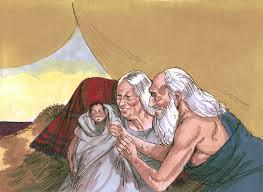NPR’s “Selected Shorts” features actors reading short stories. Today’s, “Sarah’s Story,” by Galina Vroman, read by the terrific Jane Curtin (here’s a link), was a real hoot. It was the Biblical tale of Abraham and Isaac, from the viewpoint of Abe’s wife Sarah. She is portrayed as a real person.

From left to right: Sarah, Abe, Hagar, Ishmael
The backstory: Sarah being childless, Abraham impregnated his slave girl Hagar, with Ishmael. (Owning and shtupping slaves is called “Biblical morality.”) Sarah wasn’t entirely thrilled about this. (She ultimately got Hagar and Ishmael cast out.)
But anyway, lo, at age 100, Sarah finally had a kid herself, Isaac. (Folks must have been healthier then; maybe it was the water.) Needless to say, Sarah doted on Isaac.
Then one fine day Abraham tells her of God’s latest memo: sacrifice Isaac. Sarah says, “Are you out of your mind?”
They argue. Maybe Abe’s misinterpreted the command? No, it’s perfectly clear. Sarah had always thought Abraham overdid the God thing. And what kind of cruel god is this anyway, who would demand such an atrocity? A god like that should be not obeyed but opposed. Of course devout Abie will not hear of it.
So what will Sarah do? She thinks about running away with Isaac, or even killing Abraham. Of course she is frantically upset, vividly visualizing the actual bloody deed. And when Abraham sets out, with Isaac and some flunkies, for the distant place where it is to be done, Sarah secretly follows.
Along the way she meets some traders and nomads. When Sarah purchases some billowing white cloth, I burst out laughing, at where this was now obviously going. She hires one of the nomads, to appear in costume before Abraham at the critical moment, and coaches him on his lines. She even has forethought to supply the handy ram. Abe falls for it.
This sounds like the Lucy-and-Ricky version. Traditionally, the story has been read as a parable of virtuous obedience to God. But it shows the moral gulf between its ancient author and us; he could not foresee how horribly the story would strike us. Here is Biblical morality in all its raw primitivism. The story really shows us not that Abraham was a saint but that God was a monster. Sarah had it right: why worship such a god?
Vroman’s re-telling ends with the words, “God works in mysterious ways.” This implies he omnisciently knew what Sarah would do. But didn’t Sarah – like Adam – have free will to make a choice? If I know the God of the Old Testament, he would not have been amused at Sarah’s deception. He’d have turned her into a pillar of salt, or something, at the very least, and probably smited Abe too. But the fact that he didn’t tells us the real lesson of the story: he isn’t there.
Thank God.





